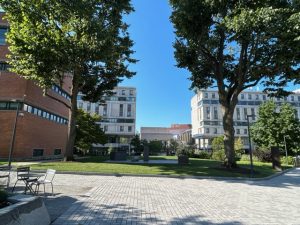Getting To Know: Drexel University-Again
I have been to Drexel University four times as an admissions advisor. most recently last week. It’s tough for me to get the full picture of the school in one visit, though I snapped a few photos and updated a Pinterest page for you. Once a very regional university, Drexel now draws just over half of its freshmen from outside Pennsylvania. It’s also one of the largest private universities in the US with over 14,000 undergrads. However, the place feels less crowded than other urban universities. That’s because half of the undergrads are working full time during the day.
If you read student reviews about Drexel, cooperative education, aka “co-op,” stands out as the best reason for choosing the school.
Many schools offer co-op, especially for business, computer science and engineering. But few bring it into virtually every major like Drexel. Most Drexel students divide their middle three years; half of each year in classes, the other half at work, usually full time. But some programs offer a single co-op taken over two quarters of the third year. If you are interested in Drexel, take a look at your potential majors and programs. While many offer the option of one co-op or three, some off only one choice. Drexel also offers accelerated programs, but some leave no time for co-op.
Drexel charges no tuition to students on co-op, but asks them to pay a student fee of around $800/quarter. That’s fair if you’re doing co-op in Philadelphia and still engaged on campus outside of work. Drexel also allows students to take one course during each quarter while on co-op for no charge.
Drexel asks you to make early choices, but also lets you change your mind.
You must choose a potential major or exploratory program as well as the terms (Fall/Winter or Spring/Summer) when you want to go on co-op. But the university lets students switch majors and co-op quarters. I suggest working with academic and career advisors after the first quarter to make sure that the classes you need towards your degree, especially major requirements, will be available during the quarters you are on campus.
What makes co-op work?
Drexel has a well-organized, well-staffed career development operation that prepares students to apply for co-ops. I’ve learned that it coordinates and oversees the employer-student relationships very well, even for majors where sponsors are harder to find. However, there are some differences between Drexel and other schools that you should know:
- Classes run on 10-week quarters instead of 14-16 week semesters. The academic work goes faster, so do exams, papers and projects. However, some classes that would run 14-16 weeks at semester schools are broken into two quarter classes at Drexel. So, you might get 20 weeks to learn some subjects, even though you will have more assignments and exams.
- With the exception of the summer after freshman year, you have no time off. You are either in classes or at work from fall of your sophomore year through the last quarter of your fifth year.
- Fortunate freshmen who can be STAR Scholars receive summer research opportunities that carry a $3,500 stipend.
- Most co-ops will be in Philadelphia, which should make things easy if you want to Iive in one place for 12 months.
- Local landlords are known to offer six-month leases to students who might co-op elsewhere.
- Some majors are tougher to place in co-op than others. Drexel has placed students into co-ops that were half-time jobs. Those students had to find a second job to make expenses.
The best parts of co-op.
Co-op is great for students who enter firmly committed to a major, or at least trying to decide between two similar majors such as Accounting and Finance. They can build strong resumes, taking on increasingly challenging responsibilities at work as they learn more at school. In addition, the co-ops that pay well might pay well enough to cover living expenses for the year. Drexel’s career development operation has also reported that co-op graduates earn higher salaries than their peers who did not do co-op. Nearly half of graduating seniors accept a full-time offer from a co-op employer.
Is co-op for everyone?
Drexel has many majors where students are typically placed in unpaid positions at other colleges as well as majors where there are clinical rotations like nursing or student teaching assignments in education. It would be wise to find out if there are paid positions versus placements that have no salary or stipends. Other colleges offer funded summer internships where a stipend pays your salary or offer credit-bearing internship courses.
What else have I liked about Drexel?
This university plays fair in admissions. You can apply Early Action, Early Decision or Regular Decision or even to start in the spring instead of the fall. Approximately 80 percent of those who apply get accepted, though only ten percent deposit. Which starts my first point about what I like about Drexel: the school cares more about helping students to do what they want to do versus trying to turn away most who want to come. Admissions are test-optional. The middle 50 percent score about the same as entering freshmen at Rutgers-New Brunswick.
Here are some other strengths of Drexel:
- The university has actual campus versus buildings scattered about a big-city neighborhood. Drexel is located next to the University of Pennsylvania. The schools might not formally socialize, but students have the opportunity to do so, if they want to. Greek life is not overly popular at Drexel, but there’s a Greek Row as you would find at less urban colleges. I dropped two campus photos below.
- Philadelphia offers more than college students could ever hope to do over four or five years. If you like the idea of feeling like a citizen of a dynamic city versus a college student who wants to bond around campus-wide events, like athletics, and traditions, Drexel might be your school.
- You can get to many places from campus within and outside Philadelphia. Drexel is one of most transit-friendly schools anywhere.
- The university offers exploratory paths for students undecided between business and the social sciences or sciences and engineering. There is also a self-designed major, but you need to take the initiative early to get approvals.
- Drexel is the only U.S. university with its own school of entrepreneurship–and you can get an equity investment for your co-op!
- You’ll find more concentrations, majors and minors than you might find at larger state schools, and more ways to combine them to earn a degree. Drexel also adds combined programs as it sees demand for double majors or multiple minors.
- If you are in the upper quarter of the admit pool there might be some very generous merit scholarships.
- Those who enter with 15-16 AP or IB credits may leave with a strong resume and a masters degree.
- There are more housing options than you might expect to find at a city school. I recommend taking dorm tours on YouTube when you can’t visit campus.
And what have I liked less?
- Drexel is quite expensive without one of the more generous scholarships. Direct charges (tuition and fees, room and board) will approach $80,000 for the upcoming academic year. My suggestion: apply Early Action and get the CSS Profile in early to have the best chance for need-based aid. The university does not produce data for average percent of need met or average student loan debt, which concerns me.
- You must also consider travel and housing if you do co-op outside of Philadelphia. Some employers are more helpful than others.
- It’s tough for a campus community to bond around events, sports or traditions when half the school is on co-op.
- There’s a lot of construction going on in University City and some sketchy areas between 30th Street Station and Drexel’s campus. You must be street-savvy here, especially at night. It can also be quite daunting to cross Market Street, one of the busiest streets in Philadelphia to get between dorms and rush-hour classes.
Conclusions
Drexel appears to make things work for the students who choose to come. Retention rates have averaged over 88 percent since 2015. Three-quarters of the students who entered in 2015 and 2016 graduated within five years. Drexel not only has a large alumni community in the Philadelphia area; it also has large communities in New York and Washington DC.
Drexel students are more empowered than they might be at other large universities. But more empowerment also carries more responsibility to plan the degree path wisely to get the best possible co-op and academic experience and graduate on time, and the costs must work out. The decision to go to Drexel, if costs work out, mainly comes down to having the desires go on co-op and live in Philadelphia.
Report Card: Drexel University (PA)
- Four-Year/Six-Year Graduation Rates: NA/B+
- Freshman Retention: B+
- Costs: B+
- Curriculum: A
- Community: A
- Comforts: B+
- Connections: A (Mid-Atlantic states)/C+ (elsewhere)
Buy my new book, The Good College!
Listen to my latest interview on ‘Tests and the Rest’ with Amy Seeley and Mike Bergin!
Listen to my talk, What Exactly Is a Good College? hosted by test-prep experts Amy Seeley and Mike Bergin on Tests And The Rest!
Listen to my talk, College Is A Learning AND Living Community hosted by Dr. Cynthia Colon from Destination YOUniversity on Voice of America Radio!
Sharing is caring!



